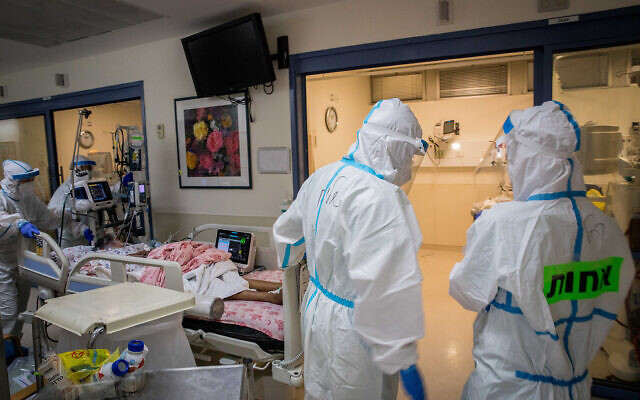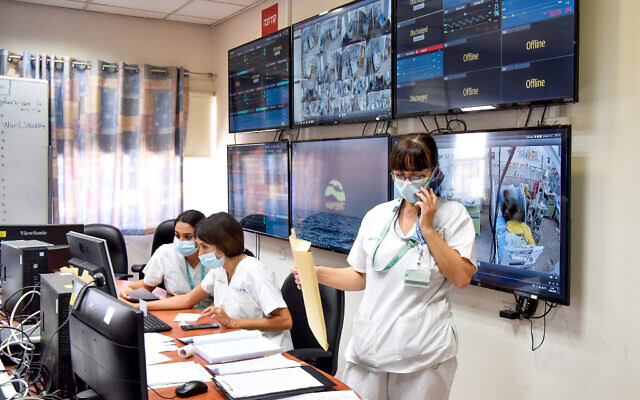PM reportedly believes national lockdown could last a month; premier to convene coronavirus cabinet Wednesday, discuss goals for emerging from lockdown, enforcement capabilities

Prime Minister Benjamin Netanyahu warned that Israeli hospitals should be prepared to treat some 1,500 coronavirus patients in serious condition by the end of the week as Israel’s infection rates continued to climb.
According to Channel 12 news, Netanyahu believes the national lockdown could be extended to last for around a month in an attempt to contain the surging outbreak.
Netanyahu held a series of discussions ahead of the start of Yom Kippur on Sunday evening and asked the relevant government ministries and authorities to urgently prepare plans to be presented this week when the so-called coronavirus cabinet convenes on Wednesday.
In a statement released by his office on Monday evening, Netanyahu set out a numbered list of items to be discussed, with the health system preparing to treat 1,500 gravely ill patients by Thursday, October 1 at the top of the list.
The number of seriously ill COVID-19 patients currently stands at 763, as of Monday evening, according to the Health Ministry.

The coronavirus cabinet will also discuss setting goals and indicators for a gradual emergence from Israel’s second national lockdown, progress in vaccines and the purchase and use of rapid COVID-19 tests.
Ministers will discuss the status of the country’s enforcement of the regulations, as well as increasing fines and sanctions for those found violating restrictions.
The cabinet will also discuss the use of digital tools to combat the pandemic, as well as a focused campaign on the wearing of masks and maintaining social distancing.
Also in the works are talks about the education system and plans to return to school, as well as assistance programs to the elderly.
As of Monday evening, Israel’s death toll from the coronavirus stood at 1,499, up 33 over the previous 24 hours. Israel also had a total of 233,118 confirmed cases since the start of the pandemic, with 66,639 active cases, 763 of them serious, and 287 in moderate condition.

On Saturday, Netanyahu admitted that his government made mistakes in emerging from Israel’s first national lockdown earlier this year, as the Health Ministry reported over 8,000 new coronavirus cases on Friday — a new single-day record.
“Did we make mistakes in the past? Of course,” Netanyahu said in a Hebrew video released by his office. “The opening of event halls was too fast. Maybe the opening of the whole school system,” he said.
He also pointed a finger at experts whom he says counseled for opening the economy; the Knesset for overturning some government decisions; and the media for what he said was a contribution to public apathy by portraying the response to the pandemic as overblown.
אנחנו בשעת חירום לאומי. כולנו צריכים להתגייס יחד כדי לנצח את הקורונה. עדכון חשוב ממני אליכם: pic.twitter.com/n2eu9Cl2Xa
— Benjamin Netanyahu (@netanyahu) September 26, 2020
Netanyahu said Israel had “no choice,” but to go back under lockdown, and urged people to stay away from synagogues over Yom Kippur.
A sweeping new lockdown took force at 2 p.m. on Friday, though lawmakers were unable to reach an agreement over planned restrictions on protests and public prayers.
Under the new rules, nearly all businesses will be closed, with the exception of specific companies and factories designated as “essential” by the Defense Ministry’s National Emergency Authority, as well as grocery stores and food shops. Restaurants are permitted to operate on a home-delivery basis only.
As reported by The Times of Israel
